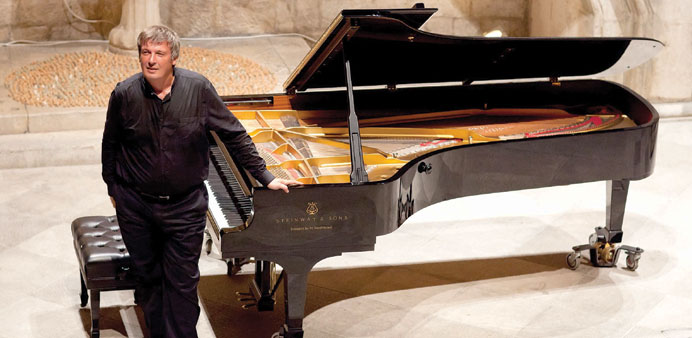THE PIANIST: Russian pianist Boris Berezovsky will be on piano at the concert. By Umer Nangiana
It is already sold out. To be conducted by legendary Dmitrij Kitajenko, Qatar Philharmonic Orchestra is all set to present its first concert after the summer break, Tchaikovsky’s First Piano Concerto.
Katara Opera House would once again host the audience to the musical treat on September 5, featuring the legendary Russian composer Pyotr Ilyich Tchaikovsky’s Piano Concerto No. 1 in B Flat Minor, Op. 23 and Symphony No. 5 in E Minor, Op. 64.
The much-awaited concert will see Dmitrij Kitajenko, one of the great conductors of present times, carry out the great Russian’s masterpieces before an eager Doha audience that usually comprise members of different expatriate communities and the members of diplomatic corps.
Tchaikovsky was a major Russian composer of the late 19th century. A key figure of Russian Romanticism and the first Russian composer of international span, he was one of the great symphonists of his generation.
Particularly gifted for melodies and a master of lyricism and sentimentality Tchaikovsky composed some of the most popular themes in all of classical music.
“Tchaikovsky showed remarkable talent for the piano from a very young age. He also manifested clear signs of an overly sensitive nature,” says his biographer Samar Slaibi.
After he was sent to Saint Petersburg to study law at the School of Jurisprudence, he lost his mother at age 14. In 1961, he abandoned his position in the Ministry of Justice to consecrate himself to music.
Relocating to Moscow for a professorship of harmony at the new conservatory in 1866, the composer wrote his First Symphony, suffering, however, a nervous breakdown during its composition. The following years witnessed the birth of his first two opera works, The Voyevoda (1867-1868) and The Oprichnik (1870–1872), his First String Quartet (1871), his Second Symphony (1873), and the ballet Swan Lake (1875).
According to Slaibi, Tchaikovsky was an established composer by 1877.
Tchaikovsky excelled in all musical genres and produced masterpieces such as opera with The Maid of Orleans (1881), chamber music with his Piano Trio (1881-1882), orchestral music with his Second Piano Concerto (1882) and his Serenade for Strings (1881).
In 1886 Tchaikovsky, with the Manfred Symphony, composed upon a poem by Lord Byron, his most beautiful success in a typically occidental musical genre. He began a conducting career in 1888 with a tour in Europe.
On his return, he was solicited by the Mariinsky Theatre of Saint Petersburg to collaborate with choreograph Marius Petipa to compose The Sleeping Beauty ballet (1890) and The Nutcracker (1892). During his tour in the United States in 1891, Tchaikovsky was celebrated greatly. He inaugurated New York’s Carnegie Hall.
Pyotr Tchaikovsky died on October 25, 1893, leaving one last major musical legacy: his most famous Symphony No. 6, the Pathetique.
Kitajenko, himself a great composer and conductor, is equally esteemed in Eastern and Western Europe, Kitajenko regularly conducts prestigious orchestras like the Berlin Philharmonic Orchestra, the Leipzig Gewandhaus Orchestra, the Vienna Symphony Orchestra, the Philharmonia Orchestra London and the Orchestre Philharmonique de Radio France.
His complete recording of Shostakovich’s symphonies with the Cologne Gurzenich Orchestra (2005) received, among others, the Echo Klassik Prize, one of the most sought after awards in the classical field.
His recording of Prokofiev’s symphonies is considered by various critics as the benchmark recording. Since 2010 he has turned his attentions to a Tchaikovsky cycle with Oehms Classics.
In autumn 2011 Symphony Nr. 5 in E minor was released, following the already available Manfred Symphony and the Pathétique, which met with an extremely positive response.
For the 2012-13 concert season Kitajenko was appointed principal guest conductor of the Berlin Konzerthaus Orchestra. Since 2009, he has been an honorary conductor of the Cologne Gurzenich Orchestra.
Born in Leningrad, Kitajenko studied at the renowned Glinka School of Music and the Rimsky-Korsakov Conservatory. He went on to study with Leo Ginzburg in Moscow and in the legendary conducting class of Hans Swarowsky and Karl Osterreicher in Vienna.
He obtained distinctions in each case. In 1969 he won the first International Herbert von Karajan Conducting Competition in Berlin and was appointed principal conductor of the influential Stanislavsky Theatre in Moscow at the age of only 29.
In the early 1970s he very successfully conducted a great number of operas in Moscow and in cities such as Vienna, Munich and Brussels in Western Europe.
He became principal conductor of the Moscow Philharmonic in 1976, making it one of the leading orchestras in the world during the fourteen years of his direction and appearing with it in the most important musical centres of Europe, the USA and Japan.
Kitajenko came to the West in 1990, successively becoming principal conductor of the Frankfurt Radio Symphony Orchestra and the Bergen Philharmonic Orchestra, as well as principal guest conductor of the Danish National Radio Symphony Orchestra.

